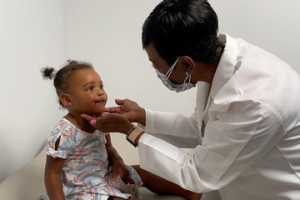

A COVID-19 vaccine study for children
The KidCOVE Study is a research study conducted by Moderna that is testing an investigational vaccine that may protect children who are ages 6 months to 11 years from getting sick if they come into contact with SARS-COV-2, the virus that causes COVID-19, also known as coronavirus. Kaiser Permanente is committed to researching a safe and effective vaccine that protects people of all ages and from all backgrounds against COVID-19.
Interested in joining?
Check your child’s eligibility.
We’ll check to see if you child may qualify for this vaccine study by asking you some questions.
Get started
Have questions?
Contact us
Trial details
The primary purpose of the KidCOVE Study is to test the safety and effectiveness of the study vaccine, called mRNA-1273, that may protect children ages 6 months to 11 years from getting sick if they come into contact with SARS-CoV-2, the virus that causes COVID-19. The study vaccine is being compared to a placebo, which is a saltwater solution that looks just like the study vaccine but contains no active vaccine. A vaccine that prevents COVID-19 disease and SARS-CoV-2 transmission in children would be a crucial public health tool to help curb the pandemic.
Estimated enrollment: 7,050 study volunteers
Phase: 2/3
Trial ID: NCT04796896
Eligibility criteria
Study volunteers must be:
- Between 6 months and 11 years old
- In good health or with stable chronic conditions
Study volunteers must not:
- Have received an investigational or approved vaccine for COVID-19
- Be currently taking any investigational or approved treatments for COVID-19
- Have tested positive for COVID-19 or been in contact with anyone diagnosed with COVID-19 within 2 weeks prior to vaccine administration
- Have participated in any clinical trial in the past month
What to expect
Participation in the KidCOVE study lasts approximately 14 months and includes up to 6 in-person visits, 2 telemedicine visits, and phone calls.
- Your child will be given 2 injections in the upper arm – about 28 days apart. Your child has a chance of receiving either the mRNA-1273 study vaccine or the placebo. By using a placebo, medical researchers are able to understand if the study vaccine is effective in preventing COVID-19.
- You and your child will be asked to return to the study site up to 6 times, depending on their enrollment assignment.
- You and your child will have 2 telemedicine visits with the study doctor after each injection, and then monthly after that to monitor for COVID-19 symptoms. During these phone calls, the study doctor and medical staff will check how your child is feeling and ask for updates on his or her health.
- You will be asked to use an eDiary app on your smartphone or a provided smartphone to report any COVID-19 symptoms your child experiences.
- Your child will be closely monitored by the study team if any symptoms of COVID-19 are reported at any time throughout their participation.
The study doctor and medical staff will talk to you and your child about additional medical support that your child will receive if he or she experiences COVID-19 symptoms at any time while in this clinical trial. Compensation for your family’s time will be available.
Frequently asked questions
A clinical trial, also called a clinical research study, is a carefully designed scientific evaluation of an investigational medication or study treatment. Clinical trials are conducted by doctors and researchers. The results of clinical studies help regulatory agencies like the U.S. Food and Drug Administration (FDA) decide if an investigational drug should be approved and made available to patients. Clinical trials are the only way we can develop new and better study treatments and improve patient care. Clinical studies are generally reviewed by an independent review board (IRB). The purpose of the IRB review is to assure that appropriate steps are taken to protect the rights and welfare of humans participating in clinical trials.1 Clinical studies are conducted by experienced and trained medical professionals who monitor the health of participants during the study.
What is a clinical research study?
Clinical research studies include scientifically evaluated plans, or protocols, that outline how to test if a potential new medication or vaccine is safe and/or effective in people. All investigational medications and vaccines must be tested in clinical research studies before they can be submitted for approval by regulatory authorities. A clinical research study is conducted by doctors and researchers who follow strict guidelines to ensure the safety and wellbeing of the study volunteers who participate. Although side effects can occur in any clinical trial, the study is designed to minimize the risk and you will be monitored closely.
What are the phases of clinical research? What is a phase 2/3 trial?
Clinical trials are conducted in phases. The trials at each phase have a different purpose and help scientists answer different questions:
• In Phase 1 trials, researchers test a new vaccine, drug or treatment in a small group of people for the first time to evaluate its safety, determine a safe dosage range, and identify side effects.
• In Phase 2 trials, the study vaccine, drug or treatment is given to a larger group of people to see if it is effective and to further evaluate its safety.
• In Phase 3 trials, the study vaccine, drug or treatment is given to large groups of people to confirm its effectiveness, monitor side effects, compare it to commonly used treatments, and collect information that will allow the drug or treatment to be used safely.
• In Phase 4 trials, post marketing studies delineate additional information including the drug’s risks, benefits, and optimal use.
This study is a phase 2/3 trial. Phase 2/3 trials may provide more information about the safety and side effects of the new vaccine. Combining phases 2 and 3 may allow research questions to be answered more quickly or with fewer study volunteers.
Reference: https://www.ciscrp.org/education-center/important-information/#faq
Why is diversity important in clinical trials?
Clinical research studies and study volunteers are vital to creating a vaccine that will protect people of all ages and from all backgrounds against this devastating disease. Given that certain populations and ages can respond differently to medical therapies, it is extremely important that this clinical research study include children of all ages, genders, races and ethnicities to ensure the vaccine is safe and effective for everyone to use.
Will compensation for time be available as part of this clinical trial?
Yes, compensation for your family’s time will be available. We realize it takes time to come for study visits, so we want to make sure this is not too much of a burden for you and your child. The study site will review these details with you.
Can my child get COVID-19 from the study vaccine being researched?
Your child cannot get infected with SARS-CoV-2 or get COVID-19 illness from the mRNA-1273 study vaccine.
What is a placebo?
In order to understand if the study vaccine works, medical researchers are comparing the mRNA-1273 study vaccine to a saltwater placebo. A placebo looks like the study vaccine being tested but does not contain the study vaccine.
What happens if my child is diagnosed with COVID-19 while in this trial?
Each study volunteer will be closely monitored by the study doctor and medical staff for symptoms of COVID-19 while in the KidCOVE Study. If a study volunteer is diagnosed with COVID-19 during the trial, the study team will notify the child’s primary care physician and the study team will continue to monitor the child’s well-being closely.
How can I check to see if my child is eligible for this trial?
You can check if your child is potentially eligible for this trial by completing a set of screening questions. You can find these on this web page by clicking the ‘Get Started’ button.
Can my child quit the trial at any time?
Study volunteers have the right to drop out of the study at any time for any reason, or no reason at all. The study doctor or sponsor also has the right to discontinue a study volunteer at any time for the volunteer’s safety, or if the study volunteer no longer meets the study requirements.

